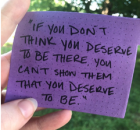
Photo by Tingey Injury Law Firm on Unsplash
Legal Interning in the Time of COVID-19: 5 Things I Learned as a Virtual Law Clerk
Published July 13, 2020 This content is archived.
Your first year of law school is intimidating. So much information is thrown at you within the first week of your 1L year that your head spins, but what you hear about the most is your first job. You talk about jobs for hours upon hours, in the classroom, in the halls, with your friends, and when you finally land a job for the summer, you’re so excited you very likely jump up and down for joy.
I had a lot of big plans for this summer. None of them included moving back home, jobless at the time, due to a global pandemic. I wouldn’t be taking the train downtown to work in an office, I wouldn’t be wearing a suit and getting to watch court proceedings in real time. At the time, I thought there was a good chance I wouldn’t be working at all. I wouldn’t be doing anything that I had looked forward to for most of this year.
Fortunately, the legal community in Buffalo is steadfast and takes care of their own. I was placed with the 8th Judicial District Internship program, with a generous stipend provided by the William F. Savino ’75, Elizabeth Martin Savino ’92, & Emma M. Savino ’18 Summer Fellowship Award through the Buffalo Public Interest Law Program. I’ve had the honor of clerking for Hon. Timothy J. Walker, acting Supreme Court Justice and Court of Claims judge, in the 8th Judicial District Commercial Court. I’ve spent this summer reading and writing in order to write decisions for real cases, in “real time” (COVID slowed things down a bit). I learned there are a couple of things that anyone can do to become a great fellow or intern, whether they’re telecommuting or in person. Here is what I learned:
1. Communicate
COVID-19 made me get over my fear of talking on the phone. I’ve had to make more phone calls in the last few weeks of my life than in the last few years. I’ve sent countless emails, questions, and drafts not only to my supervising judge, but to my internship coordinator, to speakers that I’ve had the pleasure of hearing from, fellow students, and other mentors. While we were all physically separated this summer, I talked to more people than ever. As future attorneys, it is our job to communicate. We must communicate the law to our clients, our arguments to the court, to co-counsel and to opposing counsel. My entire job this summer was to write decisions in order to communicate the court’s understanding and interpretation of the law to the advocates before it. So, be communicative.
2. Be Genuinely Curious
At first, I was nervous to reach out to my supervising judge. I think any first year law student would be nervous to reach out to a judge, especially to discuss a case. No one likes to be wrong, or to look unintelligent. We, as students and as future advocates, must be constantly learning, which can require asking “dumb” questions, for lack of a better phrase (I’m telling you that they don’t exist, my supervising judge told me they don’t exist, so I promise you… “dumb questions” don’t exist). So, I reached out to my supervising law clerk to see if I could manage most of the questions through him, or on my own.
I realized within my second week that I couldn’t do that, especially when I was reporting to him on only half of the cases I was assigned. I decided to schedule a phone call with my judge and after we spoke, I felt like a weight had been lifted off of my chest. He was so personable and relaxed, and we figured out together that the motion we were discussing couldn’t be decided on the papers. Judge Walker asked me to write up a few questions and I was able to sit in on a conference between the court and counsel.
If I hadn’t asked questions, if I hadn’t allowed myself to potentially “look unintelligent,” I would have wasted a lot of time writing a bad decision that I couldn’t fully support. It is in your best interest to ask questions, and for help, when you need to.
3. Ask Everyone You Can for Advice
The best resource you have are the people around you. Go beyond your internship supervisor, go beyond your supervising attorney, judge, or clerk. There are so many people willing to give you, as a young legal professional, advice. Recent graduates, rising 3Ls, and professors are there for you, despite not always being there with you. If I learned one thing this year, it’s that the legal community loves to talk. So, don’t be afraid to ask someone what they look for in an intern, and how you can best succeed this field. You’ll be surprised at how much you learn. As I said before, the Buffalo legal community takes care of its own, and they want to help you become the best attorney you can be.
4. Express Your Gratitude

At the end of every email I send to my supervising judge or clerk, I always say “thank you for your time.” Yes, they are ready and willing to help me when I need it, but they are working professionals who take time out of their day for me, and for that, I’m extremely grateful.
We, as law students, are extremely privileged to be where we are, even given the circumstances surrounding COVID-19. There was a time that I thought I wouldn’t have any formal legal work this summer. So, I made sure that I told those who helped me get this work that I appreciate them. I wouldn’t be where I am without the wonderful people in the University at Buffalo School of Law Career Services Office, without my professors, my mentors and my friends. I’m extremely thankful for the clerk and judge who took me on this summer. I owe all of these people, and more, a great deal for their faith in me.
5. Don’t Be Afraid
Read the last piece of advice on the UB School of Law Summer Intern Blog.
Learn more about clinics from our students our UB Law Responds Blog.
Every summer, the School of Law has a large number law students doing exciting public interest work through our fellowship program. None of this would be possible without the support from the Buffalo Public Interest Law Program (BPILP) and other generous donations funding several donor-driven fellowships.

